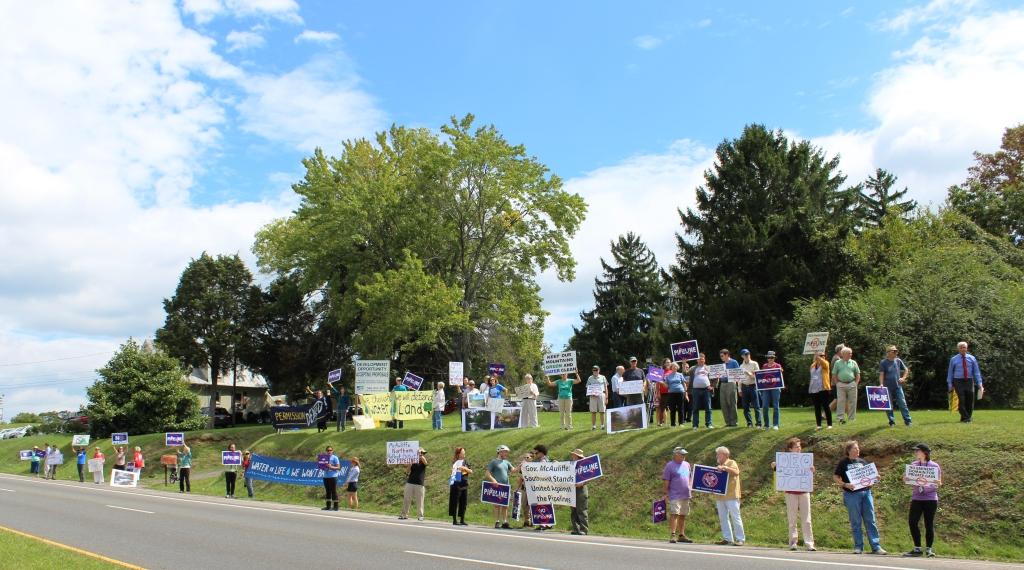Guest Post: Wild Virginia
October 15, 2017
Despite recent bad news, the future remains uncertain for two huge, destructive natural gas pipelines proposed to mar our precious mountains and forests. Approvals for the Atlantic Coast Pipeline and Mountain Valley Pipeline issued on Friday by the Federal Energy Regulatory Commission (FERC) are just one step in a continuing battle to determine the fates of these pipelines. The outcome in each case is still to be determined and we, the public, can still act to preserve our natural treasures. We have no intention of relenting in our fight and believe these bad projects can still be stopped.
Click here to to find out what you can do to fight the
Mountain Valley Pipeline.
Click here to to find out what you can do to fight the
Atlantic Coast Pipeline.
When FERC granted Certificates for MVP and ACP, it betrayed the public interest in favor of private corporate greed. We understand the disappointment many of you are feeling. It is always discouraging when supposed “public servants” fail in their duties to protect our environment and our communities. But there are a number of reasons to maintain hope. First, in a relatively unusual action, one of the FERC members dissented from her colleagues’ decisions. Such divisions within the Commission in regard to pipeline proposals have been very rare and Commissioner Cheryl Lefleur’s conclusion, that neither project was shown to best serve the public, will be useful in the court challenges that we anticipate will begin soon. The many serious deficiencies in FERC’s environmental analyses and its failure to honestly assess the need for the pipelines could be fatal flaws.
In addition, we continue to pursue formal objections before the U.S. Forest Service and the Bureau of Land Management. Draft approvals for the pipelines to cross the George Washington and Jefferson National Forests and amend forest plans are unsupported by the facts and the law. It is clear that Trump administration officials overruled the resource managers who know our National Forests best. The hard work those scientists did in defining necessary studies and identifying major threats to the forests and users interests was largely discarded and ignored by the political appointees in the Service and the Department of Agriculture.
Another vitally-important forum in which the pipelines can be stopped is the State of Virginia’s process for applying the Clean Water Act. The Department of Environmental Quality will make recommendations for approval or denial of each project in December. Neither Dominion nor EQT has met its burden of proof to show construction and operation of the pipelines will fully protect water quality – to the contrary, the very difficult terrain through which the pipelines would cross and the sensitive resources that could be destroyed or degraded make it impossible to predict that water quality standards can be met, based on the severely deficient evidence provided. Further, the unfair and legally-flawed processes DEQ has conducted have deprived the public of its rights. We will expect and demand that the citizen members of the State Water Control Board do the right thing and veto the projects in Virginia.
The pipeline companies would love for us to become discouraged by the news from FERC but we will not give them that satisfaction. From the start, we knew that FERC has traditionally been a mere “rubber stamp” for the power industry. So, while the Commission’s failure to do its duty honestly is disappointing it is not a surprise.
We need you to stick with us to enable us to continue to work to protect Virginia’s natural forests and landscapes.
Click here to to find out what you can do to fight the
Mountain Valley Pipeline.
Click here to to find out what you can do to fight the
Atlantic Coast Pipeline.
Wild Virginia is a grassroots, non-profit organization dedicated to preserving Virginia’s national forests through education and advocacy. Visit http://wildvirginia.org/ for more information. Thanks to Wild Virginia for this content.


Published by